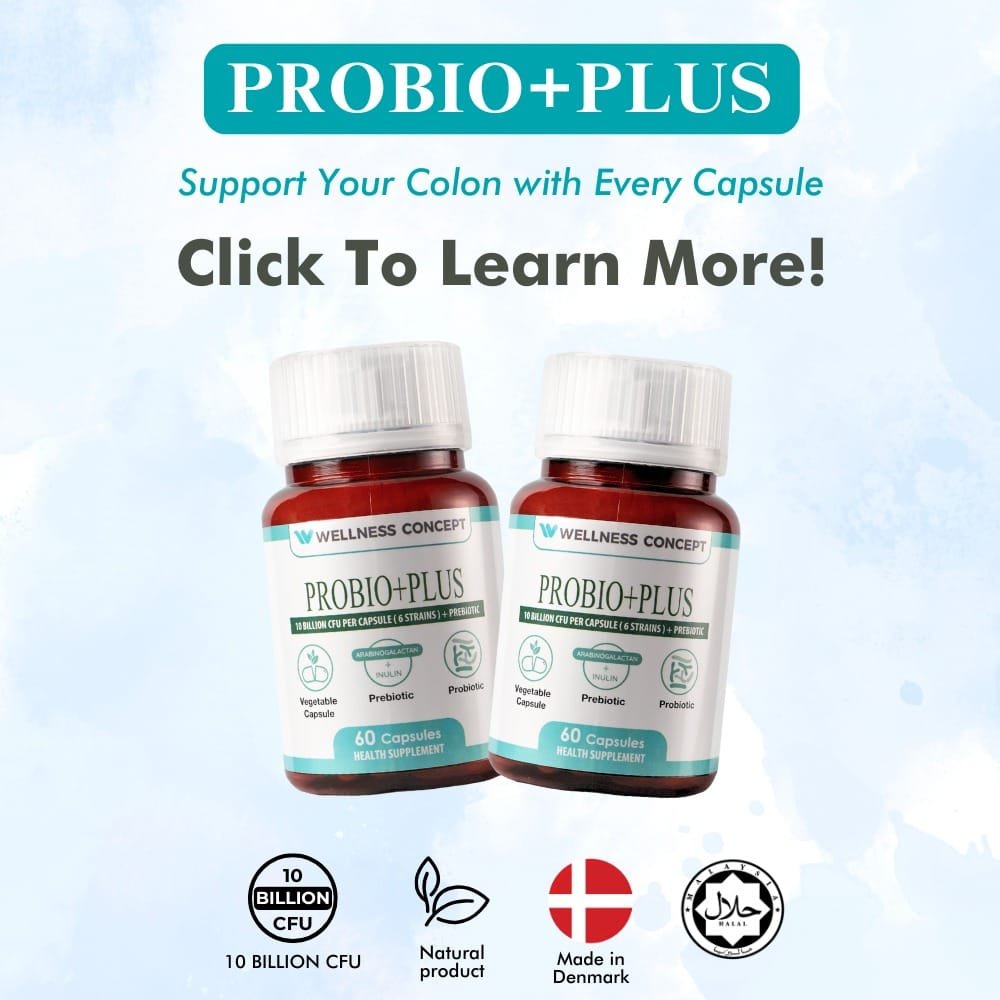Currently Empty: RM0.00
Did you know that over 70% of your immune system resides in your gut? This surprising fact highlights the critical role of gut health in overall well-being. The gut microbiome, a complex community of trillions of microorganisms, plays a vital part in digestion, immunity, and even mental health. When this delicate balance is disrupted, it can lead to discomfort and health issues.
Probiotics, live microorganisms found in certain foods and supplements, help restore this balance. They work by crowding out harmful bacteria and promoting a healthy gut environment. Research shows that specific strains, like Lactobacillus and Bifidobacterium, can improve digestion and reduce symptoms of conditions like irritable bowel syndrome (IBS).
At Wellness Concept, we specialize in guiding you toward better gut health. Whether through fermented foods or high-quality supplements, our team is here to help. Reach out to us at WhatsApp: +60123822655 during our business hours: Monday-Friday, 9:30 am-6:30 pm; Saturday, 10 am-5 pm; Sunday, Closed.
Key Takeaways
- Over 70% of the immune system is located in the gut.
- Probiotics help balance the gut microbiome and improve digestion.
- Specific strains like Lactobacillus and Bifidobacterium offer targeted health benefits.
- Wellness Concept provides expert guidance on gut health solutions.
- Contact us at WhatsApp: +60123822655 for personalized advice.
Introduction to Probiotics and Their Importance
The human body is home to trillions of microorganisms, each playing a unique role in health. Among these, probiotics stand out as live beneficial microbes that support the body’s natural functions. Found in certain foods and supplements, they help maintain a balanced microbiome, which is crucial for overall wellness.
What Are Probiotics?
Probiotics are live microorganisms that provide health benefits when consumed in adequate amounts. Unlike harmful bacteria, they promote a healthy environment in the gut, skin, and other areas. Common strains like Lactobacillus and Bifidobacterium are widely studied for their positive effects on digestion and immunity.
Overview of Their Health Roles
These beneficial microbes naturally reside in the gut, where they aid in digestion, nutrient absorption, and immune system support. When the microbiome is disrupted—a condition known as dysbiosis—probiotics can help restore balance. Fermented foods like yogurt, kefir, and kimchi are excellent natural sources.
Scientific research highlights their potential to manage conditions like irritable bowel syndrome (IBS) and reduce inflammation. For example, studies show that specific strains can improve symptoms and enhance overall health. Incorporating probiotics into daily routines can be a simple yet effective way to support the body’s natural processes.
How Probiotics Improve Gut Health
The gut is often called the body’s second brain, and for good reason. It houses trillions of microorganisms that influence digestion, immunity, and even mood. When this delicate ecosystem is out of balance, it can lead to discomfort and health issues. Probiotics play a crucial role in restoring harmony to the gut microbiome.
Balancing the Gut Microbiome
A balanced microbiome is essential for digestive health. Probiotics colonize the gut, crowding out harmful bacteria and promoting a healthy environment. They produce organic acids and antimicrobial substances that protect against infections.
Research shows that specific strains, like Lactobacillus and Bifidobacterium, enhance gut barrier function. This prevents harmful substances from entering the bloodstream, reducing inflammation and supporting overall health.
Managing Digestive Disorders
Probiotics are particularly effective in managing conditions like irritable bowel syndrome (IBS). Studies indicate they can reduce symptoms such as bloating, gas, and irregular bowel movements. For example, a 2018 meta-analysis found that certain strains significantly improved IBS symptoms in participants.
Additionally, probiotics may help with antibiotic-associated diarrhea. By restoring gut balance, they reduce the risk of diarrhea by up to 51% in some cases.
“Probiotics are a natural way to support gut health and manage digestive disorders effectively.”
| Condition | Probiotic Strain | Effectiveness |
|---|---|---|
| IBS | Lactobacillus | Reduces bloating and gas |
| Antibiotic-Associated Diarrhea | Saccharomyces boulardii | Decreases risk by 51% |
| Infectious Diarrhea | LGG | Shortens duration by 25 hours |
Incorporating probiotics into daily routines can be a simple yet powerful way to support gut health. Whether through fermented foods or supplements, they offer a natural solution for maintaining balance and wellness.
Probiotics Functions and Benefits
Beyond digestion, these tiny microbes play a significant role in overall wellness. They support the body in ways that extend far beyond the gut, influencing immunity, inflammation, and even metabolic health. Understanding their systemic impact can help individuals make informed choices for better health.
Supporting the Immune System
Up to 80% of immune cells reside in the gut, making a balanced microbiome crucial for immunity. These beneficial microbes enhance the body’s defense mechanisms by crowding out harmful bacteria and producing antimicrobial substances. Studies show that specific strains can reduce the risk of infections and improve immune response.
Regulating Inflammation
Chronic inflammation is linked to various health issues, from heart disease to autoimmune conditions. Probiotics help regulate inflammation by maintaining gut barrier function and reducing the release of pro-inflammatory molecules. Research highlights their potential in managing conditions like ulcerative colitis and Crohn’s disease.
Enhancing Metabolic Health
These microbes also play a role in metabolism. They influence hunger-related hormones, fat storage, and energy extraction from food. Studies suggest that certain strains can improve insulin resistance and support weight management, making them a valuable addition to daily routines.
| Health Benefit | Probiotic Strain | Effect |
|---|---|---|
| Immune Support | Lactobacillus rhamnosus | Reduces infection risk |
| Inflammation Regulation | Bifidobacterium longum | Improves gut barrier function |
| Metabolic Health | Lactobacillus gasseri | Supports weight management |
Incorporating these beneficial microbes into daily life can be simple. Fermented foods like yogurt and kimchi are excellent natural sources. For targeted benefits, selecting the right strain is key. Consulting a healthcare professional can help tailor choices to individual needs.
Boosting Immune Health with Probiotics
A healthy immune system starts in the gut, where beneficial microbes play a key role in defending the body. Up to 80% of immune cells reside in the gut, making it the largest immunological organ. These microbes train immune cells to respond effectively to threats, ensuring the body stays protected.
Strengthening the Body’s Defense Mechanisms
Probiotics enhance the immune system by crowding out harmful bacteria and producing antimicrobial substances. Specific strains, like Lactobacillus rhamnosus, have been shown to reduce the risk of infections. They also stimulate the production of antibodies, which are crucial for fighting off pathogens.
Research highlights that probiotics can improve immune response in both children and adults. For example, studies show that regular intake can lower the frequency of respiratory infections by up to 41%. This makes them a valuable addition to daily routines, especially during flu season.
Reducing Inflammation Through Natural Microbes
Chronic inflammation is linked to various health issues, including autoimmune conditions. Probiotics help regulate inflammation by maintaining gut barrier function and reducing the release of pro-inflammatory molecules. Strains like Bifidobacterium longum are particularly effective in this role.
Clinical studies suggest that probiotics can alleviate symptoms of inflammatory conditions like ulcerative colitis. By restoring gut balance, they promote overall wellness and reduce the risk of disease.
| Health Benefit | Probiotic Strain | Effect |
|---|---|---|
| Immune Support | Lactobacillus rhamnosus | Reduces infection risk |
| Inflammation Regulation | Bifidobacterium longum | Improves gut barrier function |
| Infection Prevention | Saccharomyces boulardii | Lowers respiratory infection rates |
Incorporating probiotics into daily life can be simple. Fermented foods like yogurt and kimchi are excellent natural sources. For targeted benefits, selecting the right strain is key. Consulting a healthcare professional can help tailor choices to individual needs.
Probiotics and Mental Wellness: The Gut-Brain Connection
The connection between the gut and the brain is one of the most fascinating discoveries in modern science. This relationship, known as the gut-brain axis, shows how the gut microbiome influences mental wellness. Trillions of microbes in the digestive tract communicate with the brain, affecting mood, stress, and even cognitive function.
How the Gut Influences Mood and Stress
Gut microbes play a key role in regulating stress hormones and mood. They produce neurotransmitters like serotonin and dopamine, which are essential for emotional balance. In fact, about 90% of serotonin, often called the “feel-good” hormone, is produced in the gut.
Research shows that an imbalance in the gut microbiome can lead to increased stress and anxiety. For example, a study found that participants who took specific strains experienced a significant reduction in anxiety scores. This highlights the potential of these beneficial microbes in supporting mental wellness.
Neurotransmitter Production and Brain Function
The gut microbiome also influences brain function by producing neurotransmitters and other signaling molecules. These substances travel through the bloodstream and the vagus nerve, directly impacting brain health.
Studies suggest that certain strains, like Lactobacillus and Bifidobacterium, can improve symptoms of depression and anxiety. For instance, a clinical trial showed that participants taking these strains had a notable decrease in depressive symptoms compared to the placebo group.
“The gut-brain axis reveals how improving gut health can lead to a happier, healthier mind.”
| Condition | Probiotic Strain | Effect |
|---|---|---|
| Anxiety | Lactobacillus rhamnosus | Reduces anxiety scores |
| Depression | Bifidobacterium longum | Improves mood |
| Stress | Lactobacillus helveticus | Lowers stress hormone levels |
Incorporating these beneficial microbes into daily routines can be a simple yet effective way to support mental wellness. Whether through fermented foods or supplements, they offer a natural solution for a balanced mind and body.
Enhancing Skin Health Through Probiotics
The skin, our body’s largest organ, is deeply connected to the gut through a unique communication pathway. This relationship, known as the gut-skin axis, highlights how internal health impacts external appearance. When the gut microbiome is balanced, it supports healthy, glowing skin. However, imbalances can lead to issues like acne, eczema, and premature aging.

The Gut-Skin Axis Explained
The gut-skin axis describes how the gut and skin communicate through the immune system, hormones, and nerve pathways. A healthy gut microbiome helps regulate inflammation and supports the skin’s barrier function. When harmful bacteria dominate, it can trigger inflammation, leading to skin conditions.
Research shows that specific strains of beneficial microbes can improve skin health. For example, Lactobacillus rhamnosus has been shown to reduce eczema severity by 56% in children. Similarly, Lactobacillus plantarum improves skin hydration and reduces wrinkles in adults.
How Probiotics Support Skin Health
These beneficial microbes play a key role in reducing inflammation and oxidative stress, both of which contribute to aging. They also enhance the skin’s natural barrier, protecting against environmental damage. Studies indicate that oral and topical applications can improve conditions like acne and eczema.
“Probiotics offer a natural way to enhance skin health by addressing the root causes of inflammation and imbalance.”
Practical Tips for Healthier Skin
Incorporating probiotic-rich foods into your diet is a simple way to support skin health. Fermented foods like yogurt, kefir, and kimchi are excellent sources. For targeted benefits, consider supplements with strains like Lactobacillus or Bifidobacterium.
- Include fermented foods in your daily meals.
- Choose skincare products with probiotic ingredients.
- Consult a healthcare professional for personalized advice.
By nurturing your gut microbiome, you can achieve healthier, more radiant skin. The gut-skin axis proves that beauty truly starts from within.
Probiotics Impact on Weight Management and Metabolism
Emerging research highlights the connection between gut health and weight management. The gut microbiome, a complex community of microorganisms, plays a crucial role in regulating metabolism and fat storage. When balanced, it supports healthy weight, but imbalances can lead to weight gain and related conditions.
Regulating Fat Storage and Energy Extraction
These beneficial microbes influence how the body stores fat and extracts energy from food. They produce short-chain fatty acids, which help regulate hunger hormones and reduce fat accumulation. Studies show that specific strains, like Lactobacillus gasseri, can decrease body fat mass and waist circumference.
Research also indicates that a diverse gut microbiome is linked to a healthier weight. For example, individuals with obesity often have less microbial diversity compared to those with moderate weight. By restoring balance, these microbes can support weight loss and improve metabolic health.
Reducing Inflammation Related to Obesity
Chronic low-grade inflammation is a common issue in obesity. These microbes help reduce inflammation by maintaining gut barrier function and regulating immune responses. A 2020 study found that Bifidobacterium animalis significantly reduced inflammation markers in participants with overweight.
Another study showed that a blend of Lactobacillus and Bifidobacterium strains led to weight loss without dietary changes. This highlights their potential as a natural solution for managing weight and improving overall health.
| Strain | Effect | Research Outcome |
|---|---|---|
| Lactobacillus gasseri | Reduces body fat | Decreased waist circumference by 1.5 cm |
| Bifidobacterium animalis | Lowers inflammation | Reduced inflammation markers by 20% |
| Lactobacillus and Bifidobacterium blend | Supports weight loss | Participants lost 4.36 kg in 6 months |
Actionable Tips for Supporting Metabolism
Incorporating probiotic-rich foods into daily routines can aid metabolism and weight management. Fermented foods like yogurt, kefir, and kimchi are excellent sources. For targeted benefits, consider supplements with strains like Lactobacillus or Bifidobacterium.
- Include fermented foods in your diet daily.
- Choose supplements with clinically studied strains.
- Consult a healthcare professional for personalized advice.
By nurturing your gut microbiome, you can support a healthier weight and improve overall wellness. The connection between gut health and metabolism proves that small changes can lead to significant results.
Incorporating Probiotics into a Daily Wellness Routine
Incorporating probiotics into your daily routine can be a simple yet effective way to support overall health. These beneficial microbes, found in certain foods and supplements, play a key role in maintaining a balanced gut microbiome. Whether you’re new to probiotics or looking to optimize your intake, these practical tips can help you get started.
Choosing the Right Supplement or Food Source
When selecting a probiotic product, it’s important to consider factors like strain diversity and colony-forming units (CFUs). Look for labels that specify “live and active cultures” to ensure effectiveness. Supplements often contain between 1 billion to 100 billion CFUs, while fermented foods like yogurt, kefir, and kimchi are natural sources with varying CFU counts.
Research shows that certain strains, such as Lactobacillus and Bifidobacterium, offer targeted health benefits. For example, they may help reduce symptoms of digestive disorders like irritable bowel syndrome (IBS) and improve immune function. Always check the label for strain information and consult a healthcare provider for personalized advice.
Tips for Consistent Daily Use
Consistency is key when it comes to reaping the benefits of probiotics. Start by incorporating probiotic-rich foods into your meals, such as adding yogurt to breakfast or enjoying a glass of kefir as a snack. If you prefer supplements, take them at the same time each day to establish a routine.
Here are some simple steps to integrate probiotics into your daily life:
- Include fermented foods like sauerkraut or miso in your diet.
- Choose supplements with clinically studied strains for targeted benefits.
- Read labels carefully to ensure the product contains live and active cultures.
Regular intake of these beneficial microbes can support digestive health, reduce inflammation, and even enhance mental wellness. For those seeking guidance, Wellness Concept offers expert advice on selecting the right products. Reach out via WhatsApp: +60123822655 during business hours for personalized support.
| Product Type | Key Features | Examples |
|---|---|---|
| Supplements | High CFU count, multiple strains | Capsules, powders |
| Fermented Foods | Natural source, diverse microbes | Yogurt, kimchi, kefir |
| Topical Products | Skin health benefits | Probiotic creams, serums |
By making probiotics a part of your daily routine, you can support your body’s natural processes and improve overall wellness. For more information on improving intestinal health, explore the latest research and recommendations.
Scientific Evidence on Probiotics and Their Uses
Scientific studies continue to reveal the powerful impact of probiotics on human health. These beneficial microbes have been extensively researched for their ability to support the gut microbiome and address various health conditions. From digestive disorders to immune support, the evidence highlights their potential as a natural solution for wellness.

Review of Key Research Studies
Clinical trials have demonstrated the effectiveness of specific strains in managing conditions like irritable bowel syndrome (IBS). For example, a 2018 meta-analysis found that Lactobacillus and Bifidobacterium significantly reduced IBS symptoms, including bloating and irregular bowel movements.
Another study showed that fermented milk containing L. acidophilus and B. lactis improved fasting glucose levels in individuals with type 2 diabetes. These findings underscore the role of probiotics in metabolic health.
“Probiotics offer a natural way to support health by addressing the root causes of inflammation and imbalance.”
Safety and Effectiveness Considerations
While probiotics are generally safe, their effectiveness depends on factors like strain specificity and dosage. Research indicates that products with at least 10^7 to 10^9 CFUs provide the most health benefits. However, not all strains are equally effective, and some may not survive the digestive tract.
For instance, L. reuteri has been shown to improve oral health, while S. boulardii reduces the risk of antibiotic-associated diarrhea. It’s essential to choose products with verified health claims and consult a healthcare professional for personalized advice.
- Select products with live and active cultures.
- Look for strain-specific research to ensure efficacy.
- Consider the CFU count for optimal benefits.
By understanding the scientific evidence, individuals can make informed decisions about incorporating probiotics into their health routines. Whether through fermented foods or supplements, these microbes offer a natural way to support overall wellness.
Conclusion
Maintaining a healthy gut is essential for overall wellness. These beneficial microbes support digestion, boost the immune system, and even influence mental health. By balancing gut bacteria, individuals can reduce stress and improve their response to various conditions.
Scientific evidence highlights the importance of selecting the right strain for specific needs. Whether through fermented foods or supplements, incorporating these microbes into daily routines can lead to significant health improvements.
For personalized advice, reach out to Wellness Concept via WhatsApp at +60123822655. Their experts can guide you in choosing the best treatment for your unique needs.
Taking small steps to support your gut health can lead to a happier, healthier life. Start today and experience the positive effects of a balanced microbiome.
FAQ
What are probiotics?
Probiotics are live microorganisms that, when consumed in adequate amounts, provide health benefits. They are often referred to as “good” or “friendly” bacteria and are found in certain foods and supplements.
How do probiotics improve gut health?
Probiotics help balance the gut microbiome by promoting the growth of beneficial bacteria. This can aid in digestion, reduce symptoms of irritable bowel syndrome, and support overall gut function.
Can probiotics boost the immune system?
Yes, probiotics can strengthen the body’s defense mechanisms by enhancing immune response and reducing inflammation. They help maintain a healthy balance of gut bacteria, which plays a key role in immunity.
Are probiotics linked to mental wellness?
Absolutely. The gut-brain connection shows that a healthy gut microbiome can influence mood and stress levels. Probiotics may support neurotransmitter production, which impacts brain function and mental health.
Do probiotics benefit skin health?
Yes, probiotics can improve skin health through the gut-skin axis. They help reduce inflammation and may alleviate conditions like acne, eczema, and rosacea by promoting a balanced microbiome.
Can probiotics aid in weight management?
Probiotics may help regulate fat storage and energy extraction from food. Certain strains have been linked to improved metabolism and reduced body weight in some studies.
How can I incorporate probiotics into my daily routine?
You can include probiotics through fermented foods like yogurt, kefir, sauerkraut, or supplements. Choose products with live cultures and follow the recommended dosage for consistent benefits.
Is there scientific evidence supporting probiotic use?
Yes, numerous studies highlight the effectiveness of probiotics for gut health, immunity, and more. However, results can vary by strain and individual, so it’s important to choose evidence-based products.
Are probiotics safe for everyone?
Generally, probiotics are safe for most people. However, those with compromised immune systems or serious health conditions should consult a healthcare professional before use.



